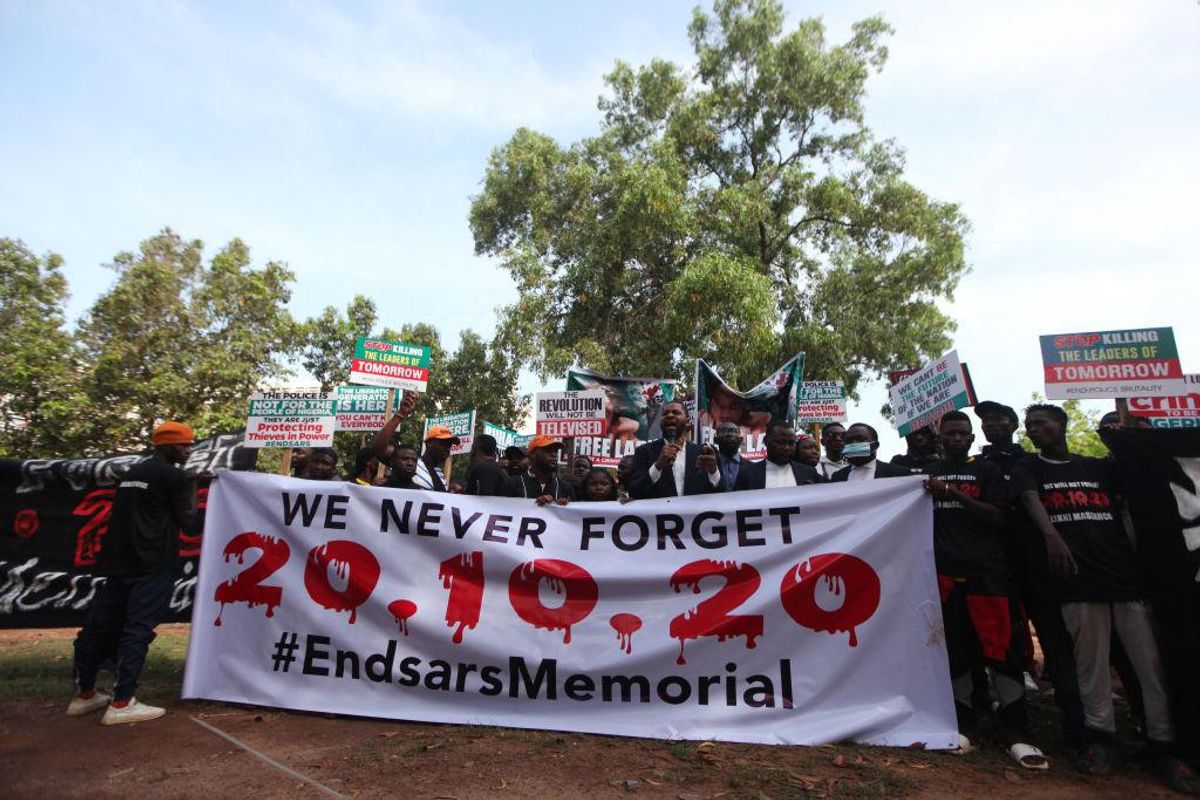#EndSARS: 1 Year Later And It's Business As Usual For The Nigerian Government
Thousands filled the streets of Nigeria to remember those slain in The #LekkiTollGateMassacre...while the government insists it didn't happen.

This week marks 1 year since Nigerians began protests against police brutality and demanded an end to the Special Anti-Robbery Squad (SARS). The #EndSARS protests took the world by storm as we witnessed Nigerian forces abuse, harass and murder those fighting for a free nation. Reports of illegal detention, profiling, extortion, and extrajudicial killings followed the special task force's existence, forcing the government to demolish the unit on October 11th, 2020. However, protestors remained angered and desperate to be heard. It wasn't until October 20th, when soldiers opened fire on demonstrators at Lekki tollgate in the country's capital, Lagos, that the protests came to a fatal end. More than 56 deaths from across the country were reported, while hundreds more were traumatized as the Nigerian government continued to rule by force. The incident sparked global outrage as the Nigerian army refused to acknowledge or admit to firing shots at unarmed protesters in the dead of night.
It's a year later, and nothing has changed.
Young Nigerians claim to still face unnecessary and violent interactions with the police and none of the demands towards systemic changes have been met. Fisayo Soyombo the founder of the Foundation for Investigative Journalism, told Al Jazeera, "Yes, there has not been any reform. Police brutality exists till today," while maintaining that his organization has reported "scores" of cases of police brutality over this past year.
During October 2020's protests, Nigerian authorities turned a blind eye and insisted that the youth-led movement was anti-government and intended to overthrow the administration of current President Muhammadu Buhari. During a press conference on Wednesday, in an attempt to discredit the protests, Minister of Information and Culture Lai Mohammed hailed the Nigerian army and police forces for the role they played in the #EndSARS protests, going as far as to say that the Lekki Toll Massacre was a "phantom massacre with no bodies." These brazen claims came while protesters continued to gather in several major cities across the country. The minister even went on to shame CNN, Nigerian favorite DJ Switch as well as Amnesty International, for reporting deaths at Lekki. Mohammed pushed even further by saying, "The six soldiers and 37 policemen who died during the EndSARS protests are human beings with families, even though the human rights organizations and CNN simply ignored their deaths, choosing instead to trumpet a phantom massacre."
With the reports of abuse still coming out of the West African nation, an end to the struggle is not in sight. During Wednesday's protest, a journalist for the Daily Post was detained by Nigerian forces while covering the demonstrations.
According to the BBC, additional police units have been set up in the place of SARS, though some resurfacing SARS officers and allies claim to still be around.
Young Nigerians relied heavily on social media during the protests and returned this year to voice their opinions around the first anniversary of an experience that few will be lucky enough to forget.
If this pops on your timeline, retweet with anger. 20.10.20! #EndSARS #WeWillNeverForget #EndSARSMemorial #EndPoliceBrutalityinNigeraNOWpic.twitter.com/DSRAO7I4ur— First Doctor (@First Doctor) 1634716938
This photograph lives rent free in my head until they give us justice #EndSARS #EndSARSMemorialpic.twitter.com/uDqUZizAXq— #DaddySoft (@#DaddySoft) 1634699954
The People Are Not The Enemy! Stop Killing Us. #EndSARS #EndSARSMemorialpic.twitter.com/EeSKlGBI8j— DeboMacaroni (@DeboMacaroni) 1634725130
I can\u2019t believe we cannot still locate people that were arrested. what the hell? you arrest people indiscriminately and start hidding them? we have checked multiple places. This is absolutely ridiculous #EndSARSMemorial #EndSARS— Moe (@Moe) 1634725779
- Nigeria's EndSARS Protests in Photos - OkayAfrica ›
- #EndSARS: Nigeria Is a Nation of Elites and 'Everyone Else ... ›
- Passport of Prominent #EndSARS Activist Seized By Nigerian ... ›
- #EndSARS: Nigerian Protests Against Police Brutality Strengthen ... ›
- Nigerian Sports Stars Speaks Up in #EndSARS Amid Ongoing ... ›
- The African Union Condemns Violence Against #EndSARS ... ›
- Poignant Moments of Continued EndSARS Protests in Photos ... ›
- How You Can Help Nigeria's #EndSARS Protests - OkayAfrica ›
- How Davido's 'FEM' Became the Unlikely #EndSARS Protest ... ›
- How Technology Is Playing a Crucial Role in the #EndSARS ... ›
- Reekado Banks Recalls The Carnage of #EndSARS in Single 'Ozumba Mdadiwe' ›

